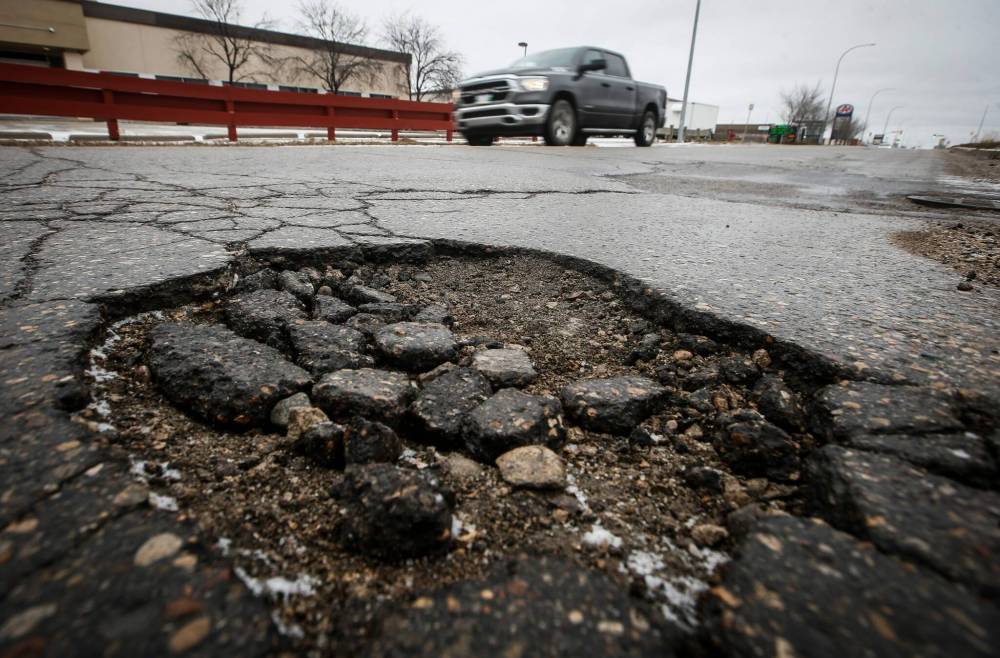Voting for worst road can get repair results
Advertisement
Read this article for free:
or
Already have an account? Log in here »
To continue reading, please subscribe:
Monthly Digital Subscription
$0 for the first 4 weeks*
- Enjoy unlimited reading on winnipegfreepress.com
- Read the E-Edition, our digital replica newspaper
- Access News Break, our award-winning app
- Play interactive puzzles
*No charge for 4 weeks then price increases to the regular rate of $19.00 plus GST every four weeks. Offer available to new and qualified returning subscribers only. Cancel any time.
Monthly Digital Subscription
$4.75/week*
- Enjoy unlimited reading on winnipegfreepress.com
- Read the E-Edition, our digital replica newspaper
- Access News Break, our award-winning app
- Play interactive puzzles
*Billed as $19 plus GST every four weeks. Cancel any time.
To continue reading, please subscribe:
Add Free Press access to your Brandon Sun subscription for only an additional
$1 for the first 4 weeks*
*Your next subscription payment will increase by $1.00 and you will be charged $16.99 plus GST for four weeks. After four weeks, your payment will increase to $23.99 plus GST every four weeks.
Read unlimited articles for free today:
or
Already have an account? Log in here »
Hey there, time traveller!
This article was published 18/03/2025 (269 days ago), so information in it may no longer be current.
Manitoba’s pothole problem is forcing motorists to dig deep into their pockets.
Half of motorists have sustained vehicle damage from the province’s crater-filled roads and 80 per cent are paying out of pocket for repairs, a recent CAA survey said. That is up 10 percentage points over last year.
The online survey polled 1,014 CAA members between Jan. 6-14 and coincides with the 14th annual CAA Worst Roads Campaign, which launches today.

JOHN WOODS / FREE PRESS FILES
Potholes continue to plague the city, but reports of bad streets are having an impact, CAA Manitoba says.
The average cost for a repair was found to be $882 and nearly half of respondents paid between $500 and $2,000, with some claims climbing as high as $6,000 depending on the make and model of the vehicle.
“This tells us that road maintenance, repair and infrastructure investment is actually an affordability issue for a lot of Manitobans,” said Ewald Friesen, CAA’s government relations manager. “This, at a time when family budgets are stretched, people are holding onto their cars longer than they historically have… the issues of (U.S.) tariffs that will disproportionately affect the automobile sector.
“We anticipate Manitobans will have to hold onto their cars for even longer. The last thing they need is to have their road infrastructure to be the cause of additional financial burden.”
In Winnipeg, crews filled in an unprecedented 357,131 potholes in 2024, a rise of nearly 115,000 from the 242,362 plugged in 2023, city figures show.
MPI saw more than double the pothole-related claims in 2024 compared to the previous year.
The most recent data from the insurance provider show it received 4,971 claims as of late November, an increase from the 2,438 claims made in 2023.
The survey showed virtually every Manitoban (96 per cent) is troubled by the state of roads in the province.
“There’s a lot of frustration,” Friesen said.
The annual campaign asked Manitobans to channel those frustrations into voting for the province’s worst roadways. The results are used by CAA to lobby municipal governments to fix the issues.
Last year’s campaign nominated 486 roads from 71 municipalities.
The campaign, which began in 2012, has led to significant repairs provincewide, including the once-troublesome 18th Street in Brandon.
Friesen said that last year’s campaign, which named the Brandon street Manitoba’s worst, got the attention of Premier Wab Kinew, who pledged to fix the road during a sitting at the legislature.
“A couple of months later, there was a press release with the funding commitment, and a few months after that, shovels were in the ground,” Friesen said.
In addition to motorists, CAA’s reporting system encourages pedestrians and cyclists to voice their concerns.
Friesen said Goulet Street in Winnipeg, voted the worst road in 2023, is now a “treat” to drive on.
“They did everything from installing bike lanes to bump-outs at pedestrian intersections to resurfacing it,” he said.
Grant Avenue, between Stafford and Rockwood streets, has also been revamped, as has Highway 75 between Winnipeg and Morris, which the province committed $61 million to fix.
CAA’s campaign is structured so people can vote once daily for their worst roads. Friesen encourages friends and family to get in on the action.
Even roads that don’t crack the top 10 get attention. Friesen said 224 Road, which runs through Peguis First Nation north of Winnipeg, is slated to be repaired this year despite falling just short of a top-10 spot last year.
Meanwhile, the survey confirmed Manitobans are a patient bunch, with 88 per cent willing to endure construction if it means a better road long term.
Nominations for the worst roads can be submitted online at caaworstroads.com starting today through April 11.
Results will be released in May.
scott.billeck@freepress.mb.ca

Scott Billeck is a general assignment reporter for the Free Press. A Creative Communications graduate from Red River College, Scott has more than a decade’s worth of experience covering hockey, football and global pandemics. He joined the Free Press in 2024. Read more about Scott.
Every piece of reporting Scott produces is reviewed by an editing team before it is posted online or published in print — part of the Free Press‘s tradition, since 1872, of producing reliable independent journalism. Read more about Free Press’s history and mandate, and learn how our newsroom operates.
Our newsroom depends on a growing audience of readers to power our journalism. If you are not a paid reader, please consider becoming a subscriber.
Our newsroom depends on its audience of readers to power our journalism. Thank you for your support.











